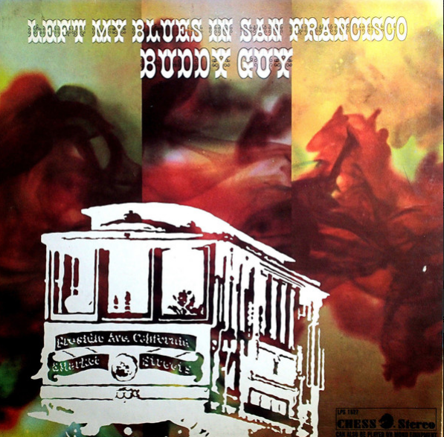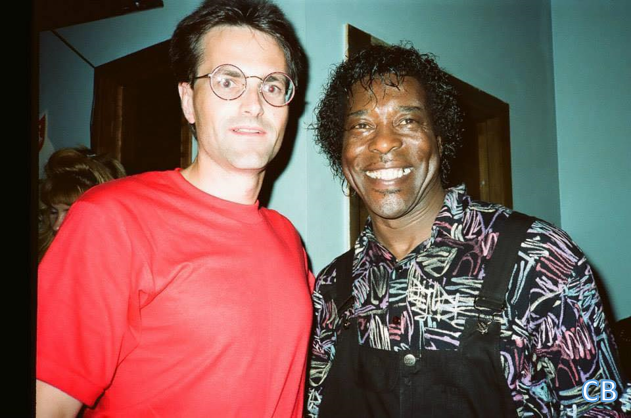Essential Blues Recording
Buddy Guy – Chicago Blues Legend At A Turning Point
Buddy Guy – Left My Blues In San Francisco – Chess Records LPS-1527
Blues fans can be deeply divided on Buddy Guy. Certain of them believe his 1960s work his best, pointing to a period where it can be argued that his always-memorable guitar playing was based upon touch, tone, and more subdued volume, instead of the auditory attacks most frequently exhibited in his latter-day works. However, that case may rest upon a wobbly underpinning, as there is no refuting the at-times wild vocal and guitar Guy afforded during his early period. That’s always been part of the attraction of Guy; the fury.
The 180-degree shifting Guy faction seems to find its roots dating to the beginning of his association with the Silvertone label, a partnering that began in 1991. Guy’s Silvertone output was initially fashioned in such a way as to bring the swagger, boldness, and high volume that he conveyed in performance to the listening public. Many blues fans want to hear and “feel” the incontestable capacity of a latter-day Guy show, and the Silvertone recordings bring that auditory volume. However, the Silvertone recordings were not in actuality the initial ones to deliver those aural gusts. In the early 1980s, Guy recorded for the British JSP label and, most especially, his 1982 collection entitled D.J. Play My Blues is a noteworthy representation of Buddy Guy captured at his most untamed.
Regardless of which Guy circle one falls into, Guy’s Left My Blues In San Francisco is arguably one of the apexes of his extensive career, an assemblage of blues that has weathered the test of time, and grants all that Guy should be identified and celebrated for, with both a sparseness and the sonic strikes that outline his many capacities, yet the blues here herald a new and modernized framework.
This original and enthralling 11-cut release dates to 1968 and was Guy’s last LP for Chess Records. The gripping selections here date from various sessions including those from 1962, 1965, 1966, and 1967. Two of these dynamic sides were written or co-written by Guy, with the remaining titles coming from saxophone great Gene Barge and Chess Records legend Willie Dixon. It should be noted that a 2013 rerelease of this outing in the Japanese market included three additional tracks.
Across the sweep of this riveting release, one finds Guy with a select group of top-tier supporting musicians whose contributions assisted in ensuring the fascinating nature of the recorded output. Those players include bassists Jack Myers, Leroy Stewart, Phil Upchurch, and Reggie Boyd, drummers Charles Stepney and Phil Thomas, guitarists Lefty Bates and Matt “Guitar” Murphy, tenor saxophonists A.C. Reed, Abb Locke, Gene Barge, Jarrett Gibson, and Milton Bland, plus trumpet players Murray Watson and Sonny Turner. And front-and-center among all this upper echelon talent is Guy’s dynamic guitar stylings and singing.
Things were changing when Guy and his esteemed crew laid down these songs, as the traditional blues sounds brought north with the wave of the great black migration from the U.S. South were fading, with audiences seeking a more up-to-date metropolitan sound including a more soulful approach, plus band augmentations with horns. It was the new urban sound fans wanted.
And Guy does not disappoint. He remains as unpredictable as ever with both his guitar workouts and singing, though there is a more affecting flair to his offerings; a more soulful approach, if you will. Nonetheless, he remains highly volatile, in keeping with what has always made Guy attractive to his legions of staunch fans.
This is a hipper Guy, someone not at all shunning what made him famous, but an artist in transition who is keeping up on things. This is a fantastic document of a major blues figure changing with the times.
Memorable titles? “When My Left Eye Jumps,” “Leave My Girl Alone,” and “Keep It To Yourself,” for starters, but the whole of this collection simply gratifies.
This remains one of Guy’s best efforts ever, and for that reason it is considered essential.
Buddy Guy: a man and the blues, indeed!

